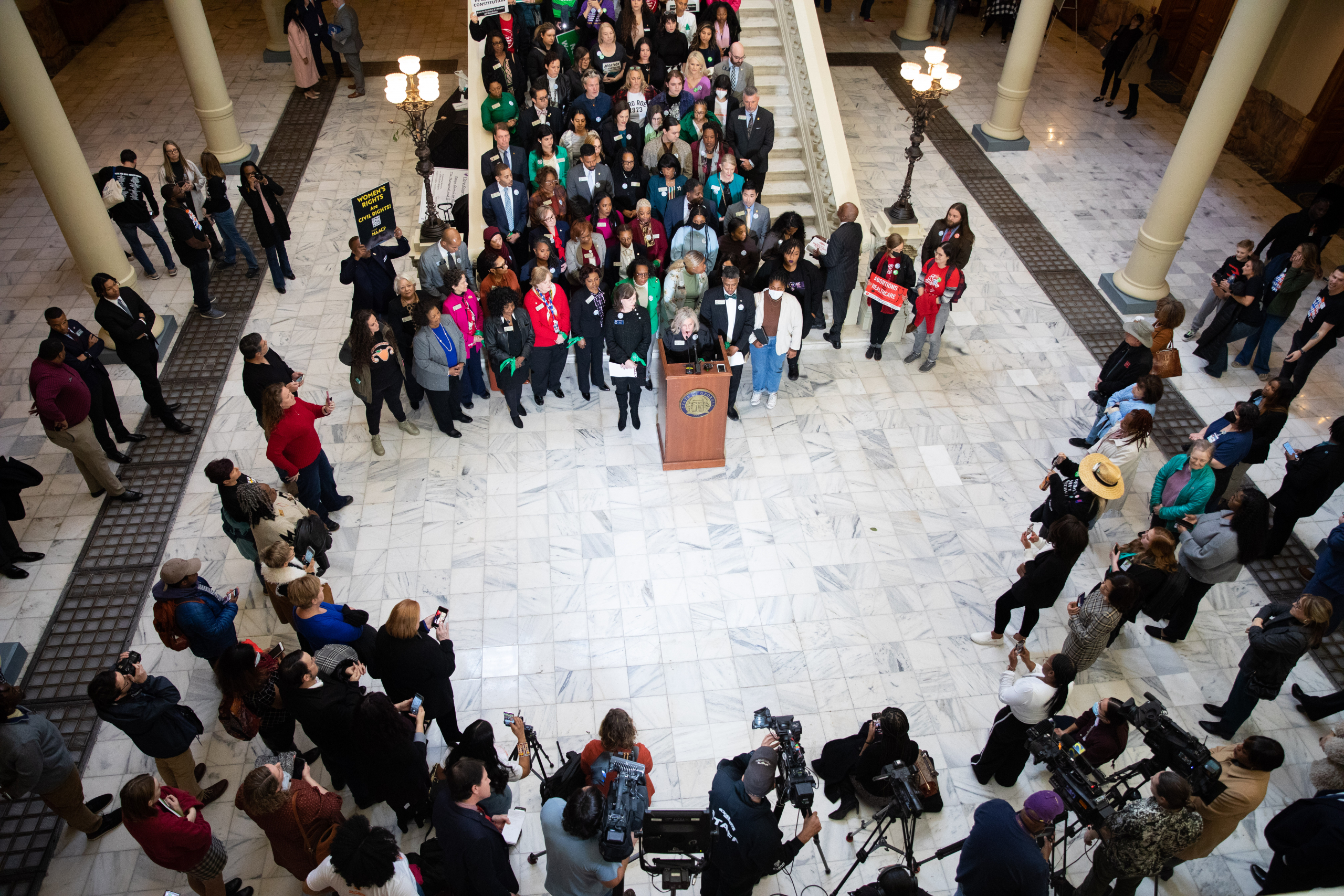The Senate is Starting to Roll . . .
For three weeks, office-less freshman legislators have roamed the halls looking for a place to land. I’m happy to report that finally, everyone has an office! While the Senate hasn’t had a single floor vote yet on an actual bill, Committees, County Delegations, and various Caucuses are finally up and running. This week, I was elected Vice Chair of both the DeKalb Senate Delegation and the Working Families Legislative Caucus.
On a Roll for Reproductive Freedom
While the courts hash out the constitutionality of Georgia’s abortion ban, Rep. Shea Roberts and I partnered with a coalition of reproductive justice organizations to introduce the Reproductive Freedom Act (RFA). The RFA not only reverses Georgia’s abortion ban, it also eliminates many of the barriers to access such as restrictions on insurance coverage and unnecessary waiting periods.
You can sign Amplify Georgia’s petition to send a message of support and get updates on ways you can advocate for the bills. Let my Republican colleagues know that we are not going away on this issue.
Rolling out the Red Carpet for Gov. Kemp
“Mr. President, his Excellency the Honorable Brian P. Kemp, Governor of the State of Georgia, and his committee of escorts await entrance into the Chamber.” — Georgia House of Representatives Doorkeeper
Pomp and circumstance returned this Wednesday in a special Joint Session of the Georgia House and Senate for the Governor’s State of the State Address. I always enjoy seeing my colleagues, old and new, in the House chamber, where I served from 1999 – 2005.
There were no surprises in the Governor’s State of the State Address. Three weeks into the session, most of the Governor’s priorities have already been revealed, especially during the budget hearings. The Governor failed to mention some impactful budget omissions.
Huge Costs Are Rolling Downstream
Every morning at 9 am, the Senate Democratic Caucus meets to discuss what’s coming our way. With no bills on the floor this week, we dove deeper into the Governor’s proposed budget to talk about issues hiding below the surface, such as enormous costs rolling down to our local school districts.
Insurance Costs: We learned that the cost of the State Health Benefit Plan (SHBP), the insurance plan that covers state and public school employees, is set to increase by 67%! Governor Kemp’s budget includes funds to offset this increase for state-funded teachers, but not for other school employees like bus drivers, administrative staff and cafeteria workers. Local school systems will have to foot this very expensive bill, to the tune of $745 million.
Pay Raises: These same school employees were overlooked again when the Governor extended pay raises to teachers, but not to “classified employees” (non teachers). Local school districts that want to give equitable pay raises to all of its employees will have to fund those salary increases themselves. This is a continuation of a larger years-long trend of the state underfunding education by shifting more and more costs to local districts.
While our local officials have to figure out how to make ends meet, the Governor’s proposed budget maintains record state reserves and gives politically-motivated tax refunds. I often wonder how many people would choose to forgo these modest tax refunds in order to keep their local school system and government whole.
Foster Kids Get Steamrolled by the System
In my last Snapshot, I mentioned the heartbreaking practice of “Hoteling,” where Georgia’s most vulnerable foster kids get placed in seedy hotels when there is no other place for them to go. Thankfully this got the attention of Sen. Ben Watson, Chair of Senate Health and Human Services. On Wednesday, he and Sen. Kay Kirkpatrick, Chair of the new Children and Families Committee, co-Chaired a special Joint Committee hearing to get to the bottom of why this is happening.
It was a tough hearing to watch. A range of professionals who see these cases everyday all shared gut wrenching stories of kids with severe behavioral issues. The parents can’t handle them and the family becomes endangered by their untreated behavioral issues. Many of the kids have severe autism. Once they enter the foster care system, they get bounced around from foster families, to short-term Crisis Stabilization Units, to psychiatric hospitals, to hotels, and then back again. They are often left in limbo waiting for a managed care insurance company to pre-approve medical needs that get denied so often that DFCS has hired a team of lawyers to fight through the red tape. Service providers for these kids are scarce because our provider reimbursement rates are so low.
So much of this — unattainable services, lack of providers due to low reimbursement — echoes my disabilities work. The system is terribly broken, and government leaders are finally taking note. The Department of Human Services Commissioner brought this issue to members of the powerful Appropriations Committee — many of whom are influential Committee Chairs. Now two of them are committed to rolling up their sleeves and working together to help these children get the support they need.
Getting the Ball Rolling on Part-Time University Fees
On Thursday, I welcomed University Chancellor and former Governor Sonny Perdue to my office to open a conversation about my work to push for prorated university fees for part-time college students. Part-time students often pay 100% of fees, resulting in degrees that cost thousands of dollars more than degrees cost for full-time students.
Chancellor Perdue is in a tough spot. University enrollment is down at many schools, and the state still funds the University system well below the rate it did back before the 2008 Recession. I’m determined to continue to advocate for part-time students. My intern Anna, a recent UGA graduate, joined us for the meeting and offered the Chancellor first-hand experiences of part-time students struggling to pay for school. This was the first of many conversations to come.
Rolling into Next Week
Monday is the ninth day of the legislative session. By the Georgia constitution, our session is limited to 40 days — so we are almost one-quarter of the way there. And freshman legislators just got their offices! Hopefully next week we will see some bills start rolling through the process.

On Tuesday, Rep. Shea Roberts and I filed identical Reproductive Freedom Act bills in both the House & Senate. A large crowd gathered in the Capitol for speeches and to take questions from the press. As long as there is a ban on obtaining abortions in Georgia, we will not be silent!

